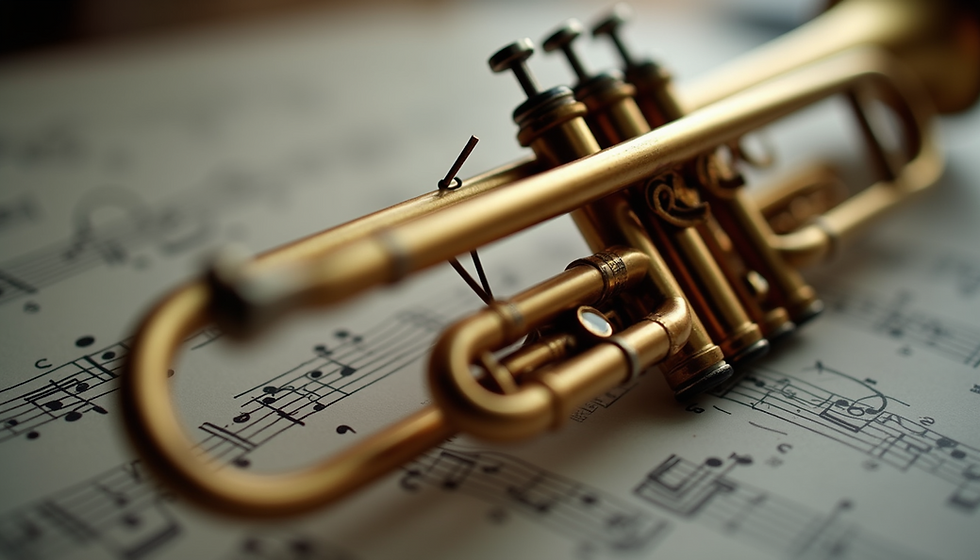The Importance of Tone in Trumpet Playing: Valuing Emotion Over Technical Skill
- Jul 31, 2025
- 4 min read
Updated: Aug 1, 2025
The undeniable charm of trumpet playing lies not just in hitting notes perfectly but in weaving emotions into sound. Many trumpet players grapple with the choice between honing technical skills or focusing on developing a captivating tone. Although both elements matter, it is often the quality of tone that leaves a lasting impression on listeners. In fact, research shows that 85% of audiences prefer a performance that evokes strong emotions over flawless technical execution.
Understanding Tone
Tone is the unique quality of sound produced by an instrument. For trumpet players, a rich, warm tone is vital for expressing emotions effectively. This distinction is often what sets an exceptional musician apart from technically skilled peers.
Several factors can influence a trumpet's tone, including the player's embouchure (the way the mouth interacts with the instrument), breath control, and the trumpet's condition. For instance, players who maintain their instruments report a 30% improvement in sound quality. By focusing on these foundational elements, musicians can create a more engaging sound.
The Emotional Impact of Tone
The sound of a trumpet should tell a story. Whether playing a heartwarming ballad or an upbeat jazz tune, emotional depth depends on the quality of tone. A player may master rapid passages, but if the tone lacks warmth, the performance can feel uninspired.
Listeners often connect more deeply with emotional expressions conveyed through sound than with virtuosic displays. For example, renowned trumpeter Miles Davis was celebrated not just for his technical skill but for the emotional weight he carried in every note. In genres like jazz and classical music, the richness of tone can lead to moments of catharsis for both musician and audience.
Technique: An Important Foundation
While tone is essential, it does not mean that technique should be overlooked. Mastery of skills like finger speed, intonation, and breath control is crucial in executing a musician's vision. However, these abilities should support the music rather than overshadow it.
Focusing excessively on speed can result in robotic performances that feel disconnected. Conversely, players who emphasize tone often find that their technical skills improve. For instance, practicing long tones—a method to build a steady sound—can enhance both tonal quality and muscle control.
Finding Your Unique Voice
Embracing individuality is key for trumpet players seeking a more expressive tone. Each musician possesses a distinct sound that can be nurtured over time. This personal touch is what elevates great artists above simple technicians.
Experimentation is essential. Consider trying different mouthpieces or adjusting your embouchure through various playing styles. A study indicated that musicians who explore different techniques are 40% more likely to discover their unique sound, leading to richer emotional expression.
Listening vs. Playing
Developing an emotional tone involves becoming an active listener. Analyzing recordings from trumpet legends known for their emotional expression can provide valuable insights. Pay attention to their phrasing, vibrato, and dynamics.
For instance, Louis Armstrong mastered the art of using dynamics to convey emotion, emphasizing the impact of subtle sound changes. By understanding these nuances, you can better connect with your instrument and enhance your tone.
Emphasizing Storytelling
Every trumpet performance is a chance to tell a story. As a player, you can take the audience on an emotional journey—whether it's joy, sorrow, triumph, or nostalgia—all expressed through your tone.
By prioritizing the music’s emotional aspects, you can engage your audience far better than simply showcasing technical skill. Remember, a memorable performance is often about evoking feelings, not just demonstrating speed.
Embracing Imperfection
In the pursuit of a rich tone, it's important to recognize that perfection is not the goal. Often, the imperfections contribute character and depth to your sound. Embracing flaws can result in a more authentic musical expression.
If you make a mistake during a performance, use your emotion to guide you. Concentrate on the music's feeling and let your tone bring you back in line. The human experience in music is where true beauty lies.

Practical Tips for Developing Tone
Breathing Exercises: Regular practice of breathing exercises can increase lung capacity and control, contributing to a fuller sound.
Long Tones: Dedicate practice time to long tones, focusing on a steady, even sound. This method helps muscle memory for your embouchure and improves tonal control.
Dynamic Playing: Experiment with playing at different dynamics. Gradually adding volume or softening can enhance emotional expression.
Record Yourself: Listening to recordings of your playing can reveal aspects of your tone and execution that need improvement.
Seek Feedback: Constructive criticism from peers and educators can shine a light on areas that require attention.
Reflecting on the Emotional Journey
In the realm of music, emotional tone holds far more weight than fleeting technical skill. While speed and precision are notable, it is the depth and richness of your trumpet sound that will resonate with audiences. By prioritizing tone, musicians can foster a deeper connection to their craft and their listeners.
Developing an engaging tone takes time, commitment, and a willingness to explore emotional expression through your instrument. Embrace the journey. Remember, it’s not just about how fast you can play; it’s about the depth of connection you can forge with each note.




Comments